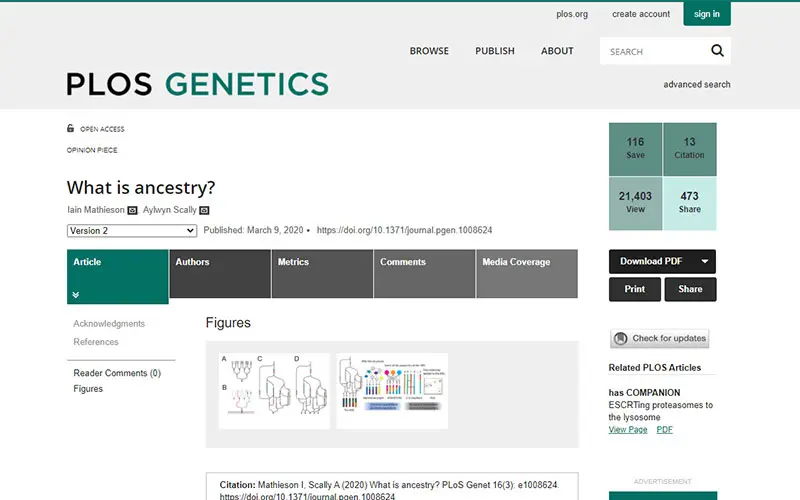Almost everyone is interested in their family tree and heritage; this interest accounts for a projected market of over $12 billion in genealogy services and products over the next seven years.
However, before you start researching your family history, it’s a good idea to understand the purpose of genealogy and some of the terminologies.
Genealogy is the study of how one generation is connected to the next.
The purpose of genealogy is to preserve the past for future generations, tracing family history and origins by searching historical records, online databases, oral interviews, and genetic records.
There are many different ways of exploring genealogy. For example, are you interested in finding out about your ancestors?
Or, are you more interested in starting with a known ancestor and tracing their descendants?
Where do family history and ancestry enter into the picture?
This article gives you the information you need to understand the purpose of genealogy and begin exploring your family tree.
What is the Purpose of Genealogy?

As mentioned above, genealogy is the study of how one generation is connected to the next.
The results are most commonly understood as the “genealogical ancestry” from one’s parents to their grandparents and continuing from their great-grandparents.
Tracing a family tree describes a family’s relationships and the lineage of its members.
The purpose of genealogy is to help people define their family tree and discover their heritage by tracing lineage and exploring historical context through generations of family.
There are many reasons someone might be interested in understanding more about their family tree and history.
Most commonly is simply being curious about who you descended from and understanding more about your family’s history and cultural heritage. In this sense, you could say that genealogy is history on a personal scale.
In general, though, here are the primary reasons people are interested in genealogical research:
1. Curiosity About Heritage
All of us have a desire to know where we came from—our family tree, historical roots, our heritage.
However, in addition to curiosity about “how we got here,” there are other important reasons for researching our family history—especially if our family history is unknown due to adoption or divorce.
In this case, the purpose of genealogy is to help people search for birth parents.
2. Concerns About Hereditary Disease

Another important purpose for genealogy is to know your extended family’s medical history.
In this case, knowing your genealogy could literally save your life.
It’s possible that one generation of a family may only carry the genetic component for a disease, with offspring in the next generation actually being affected by the disease.
Hereditary diseases and conditions merit their own genealogical discussion, but here are three you may recognize:
- Tay-Sachs disease
- Color blindness
- Hemophilia
Many people will learn about their generational lineage to prevent treatable conditions from occurring, or at the very least, provide insight into what conditions they or their children could develop over time.
3. Cultural and Religious Interests

Your standing or acceptance within a community may depend on your ancestral heritage.
For example, to be considered Native American requires at least 1/16 Native heritage or one great-great-grandparent.
Church records are excellent genealogical resources. These records are important for religious purposes but also serve as an invaluable global genealogical resource.
For example:
- The Church of Jesus Christ of Latter-day Saints has compiled and shared records of genealogical interest since 1894, offering over 3 billion records of deceased ancestors.
- Mormon archives are available for free via the Family History Library in Salt Lake City.
4. Legal and Forensic Research
Lawyers do genealogical searches in reviewing wills to establish and confirm property heirs.
This probate process may not always be simple—in which case, a forensic genealogist may be called in to do the research.
A forensic genealogist may also aid in the research of crimes or to confirm the identity of victims.
One of the most famous cases where forensic genealogy was used was that of the Golden State Serial Killer, which had been unsolved for decades.
5. Research
Genealogical research is also done by those with an academic interest, from historians to writers researching lineage and family history (often for years for a historical novel).
Scientific research can also rely on genealogy; for example, “Defining the Genetic Etiology of Alzheimer’s Disease in the Faroe Islands” relies on a detailed genealogy going back nearly 400 years.
According to the study, 94% of the population of the Faroe Islands have genes that can be traced back to one individual, making this an ideal population for genetic and genealogical research.
What is the Difference Between Genealogy and Ancestry?

There’s sometimes confusion in understanding because ancestry and genealogy are often used interchangeably.
Your ancestry begins with you and traces your heritage to your ancestors in the past, “identifying individuals from whom you are biologically descended.” Genealogy refers to a person’s descent (or family or group) from an ancestor or ancestors.
Here’s another way to think about the difference:
- Genealogy is concerned primarily with establishing your lineage in terms of a family tree—how members of your family are biologically related to one another.
- Your ancestry can also be thought of as a characteristic or category of interest. Ancestry connects genetics and society. When ancestry is used as a label referring to some aspect of culture or geography, if one of your eight grandparents was from Scotland, you might say you have “Scottish ancestry.” Remember, though, that ancestry categories are arbitrary and should only be used in an informal, general sense.
A thorough exploration of your genealogy and ancestry may also include a combination of multiple areas of research that go beyond these concepts. And all of it will most likely be fascinating and full of the unexpected!
What to Keep in Mind as You Explore Genealogy
If you’re considering exploring your genealogy, you’ll probably start with yourself and work backward through your ancestral tree.
But you may be surprised with the perspective and results gained by studying the descendants of known ancestors by using descending genealogy searches too.
Consider developing a genealogy research plan. If you work with a professional genealogist, then you’ll definitely want to create a plan.
Doing so will help you be specific about the purpose of your research and what you’re looking for as a result.
For example, if family lore has it that your great-great-grandmother was the first Native American doctor and you want to write her story, you’ll share all you can with a genealogist.
Chances are that you’ll also want to take advantage of one or more of the genealogy websites and family tree builders available now.
Here are two resources to help you get started:
- The “Big Four Genealogy Websites” resource provides a comparison of Ancestry.com, FamilySearch, Findmypast and, MyHeritage. All of these provide access to “billions of historical records, extensive family trees, and genetic connections.”
- For an additional review perspective, check out the “Best Family Tree Builders of 2024,” which also covers the sites mentioned above plus others.
For more ideas, check out our list of genealogical tools and gadgets.
In Summary
This article has touched on the basics of several different aspects of genealogy.
But all in all, genealogy provides a doorway to the past, an understanding of those who have gone before you and how they contributed to making you who you are today.
Understanding your family’s genealogy and heritage can help you better understand their challenges and triumphs, helping you be more compassionate and committed to carrying on the best of their legacy.


